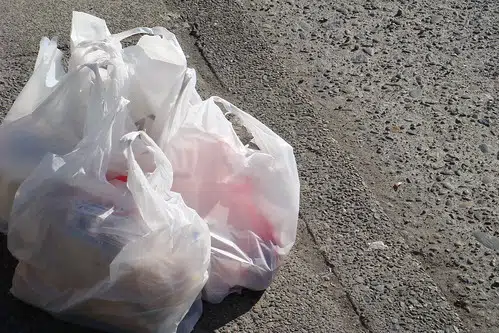Plastic checkout bags are becoming a thing of the past in municipalities throughout Greater Saint John.
A new bylaw banning single-use plastic checkout bags at businesses will go into effect this week.
The ban begins Wednesday in Rothesay, Quispamsis, Grand Bay-Westfield, Hampton and St. Martins, and Thursday in Saint John.
“Before you head out to any store or restaurant in the Fundy region, you will need to bring your own bags,” said Brenda MacCallum, public relations and program development officer with the Fundy Regional Service Commission.
Commission members have been working to implement a region-wide plastic checkout bag ban for more than a year now.
The commission stopped accepting plastic bags in recycling in March 2020 after years of struggling and failing to secure an end-recycling market.
The plan was to implement the ban in July 2020, but the change was delayed in light of the COVID-19 pandemic.
“We are thrilled with the actions and we’ve had all of the municipalities working together and cooperating together to adopt and make sure the bylaw is the same across the region,” said MacCallum.
A survey conducted by the commission and the Saint John Region Chamber of Commerce last fall found that 75 per cent of businesses in the area supported the banning of plastic bags.
Eighty-three per cent said a ban would have little to no impact on their operations, while 10 per cent indicated a ban would have a significant impact on their operation beyond six months of being implemented.
Businesses can choose to provide recyclable paper bags in place of plastic bags and whether or not to charge customers a fee, she said.
Even with the ban, the commission said plastic bags can still be provided for certain things, such as:
- holding loose bulk items such as fruit, vegetables, nuts grains or candy
- holding loose small hardware items such as nails and bolts
- containing or wrapping frozen foods, meat, poultry, or fish whether pre-packaged or not
- wrapping flowers or potted plants,
- protecting prepared foods or bakery goods that aren’t pre-packaged
- containing prescription drugs
- transporting live fish
- protecting linens, bedding or other similar large items that cannot easily fin in a reusable bag
- protecting newspapers or other printed material to be left at a person’s home or business
- protecting clothes after professional laundering or dry cleaning
- protecting tires that cannot easily fit in a reusable bag
It will be up to businesses to decide how they manage their remaining plastic bags once July 1 rolls around.
According to the commission, they can sell them or ship them to a business location without a plastic bag ban. They can also donate them to a charity that can use plastic bags when serving their clients, like a food bank.
“For the most part, this is a no-brainer,” MacCallum said of the ban. “People get it, they understand. The message has been around for a long time that checkout bags are used for a few minutes and we have way too many of them.”




